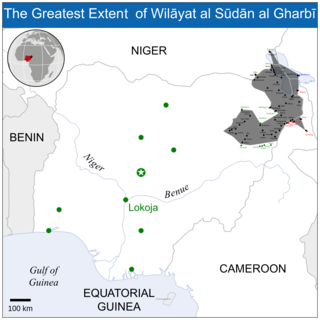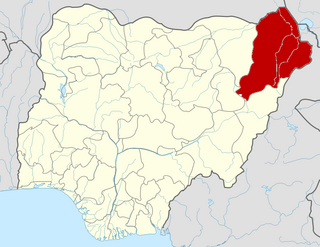
Boko Haram, officially known as Jamā'at Ahl as-Sunnah lid-Da'wah wa'l-Jihād, is an Islamist jihadist organization based in northeastern Nigeria, which is also active in Chad, Niger, northern Cameroon, and Mali. In 2016, the group split, resulting in the emergence of a hostile faction known as the Islamic State's West Africa Province.
Marte is a Local Government Area of Borno State, Nigeria, on the western coast of Lake Chad. Its headquarters are in the town of Marte

Gwoza is a local government area of Borno State, Nigeria. Its headquarters are in the town of Gwoza, a border town "about 135 kilometres South-East of Maiduguri." The postal code of the area is 610.
Fotokol is a town and commune in Logone-et-Chari Department, Far North Region, Cameroon. It is home to Fotokol High School.

The Boko Haram insurgency began in July 2009, when the militant Islamist and jihadist rebel group Boko Haram started an armed rebellion against the government of Nigeria. The conflict is taking place within the context of long-standing issues of religious violence between Nigeria's Muslim and Christian communities, and the insurgents' ultimate aim is to establish an Islamic state in the region.
Timeline of the Boko Haram insurgency is the chronology of the Boko Haram insurgency, an ongoing armed conflict between Nigerian Islamist group Boko Haram and the Nigerian government. Boko Haram have carried out many attacks against the military, police and civilians since 2009, mostly in Nigeria. The low-intensity conflict is centred on Borno State. It peaked in the mid 2010s, when Boko Haram extended their insurgency into Cameroon, Chad and Niger.
As of 31 August 2020, Cameroon hosted a total refugee population of approximately 421,700. Of these, 280,500 were from the Central African Republic, driven by war and insecurity. In the Far North Region, Cameroon hosts 114,300 Nigerian refugees, with the population sharing their already scarce resources with the refugees.
Amchide is a town in Cameroon, on the border with Nigeria. It abuts the Nigerian town of Banki, with streets and even houses straddling the border.
The December 2014 Cameroon clashes were a number of incidents that occurred between 28–29 December 2014 in variety of locations in Cameroon's Far North Region. The event included attacks on civilians and military positions carried out by Nigeria-based Boko Haram; the attacks were followed by a successful Cameroonian military counter offensive.
The January 2015 raid on Kolofata was an unsuccessful assault on a Cameroonian military base at Kolofata, Far North Region, perpetrated by Boko Haram. The incident occurred on 12 January 2015 coming shortly after another Boko Haram incursion onto Cameroonian soil.
The following lists events that happened during 2015 in Chad.

Starting in late January 2015, a coalition of West African troops launched an offensive against the Boko Haram insurgents in Nigeria.
The 2015 Chad suicide bombings were a suicide attack which occurred the afternoon of Saturday 10, October 2015 in the town of Baga Sola, Chad, a small fishing community on Lake Chad. The attack was allegedly perpetrated by the Nigeria-based Islamic extremist group Boko Haram and resulted in the deaths of around 36 individuals, and wounded upwards of 50 more. The attacks were reportedly carried out by two women, two children, and a man with the intended targets being a busy marketplace, and a nearby refugee camp hosting tens of thousands of Nigerians. It was the deadliest attack to take place in the Lake Chad region.
On 30 January 2016, at least 86 people were killed and at least 62 more injured in an attack by Boko Haram militants on Dalori Village 4 kilometers from Maiduguri, Nigeria. The attack was a reprisal against the Civilian Joint Task Force, and it began when militants in two cars and on motorcycles entered Dalori and began to shoot at residents and firebomb their huts. One estimate is that perhaps more than 100 militants were involved in the attack. The attack lasted for about four hours, and the militants allegedly burnt children alive.

On 22 March 2017, at approximately 4:30 a.m, a series of bomb blasts occurred in three locations in the Muna Garage area of Maiduguri, Borno State, northeastern Nigeria. The blasts occurred at the Muna Garage internally displaced persons (IDPs) camp.
Bodo is a village in the Far North Region of Cameroon, adjacent to the border with Nigeria.

The Chad Basin campaign of 2018–2020 was a series of battles and offensives in the southern Chad Basin, particularly northeastern Nigeria, which took place amid the ongoing Boko Haram insurgency. The Chad Basin witnessed an upsurge of insurgent activity from early November 2018, as rebels belonging to the Islamic State's West Africa Province (ISWAP) and Boko Haram launched offensives and several raids to regain military strength and seize territory in a renewed attempt to establish an Islamic state in the region. These attacks, especially those by ISWAP, met with considerable success and resulted in the displacement of hundreds of thousands of civilians. The member states of the Multinational Joint Task Force (MJTF), namely Nigeria, Niger, Chad, and Cameroon responded to the increased insurgent activity with counter-offensives. These operations repulsed the rebels in many areas but failed to fully contain the insurgency.
In May 2021, the Islamic State's West Africa Province (ISWAP) launched an invasion of the Sambisa Forest in Borno State, Nigeria, which was serving as the main base of Boko Haram, a rival jihadist rebel group. Following heavy fighting, ISWAP overran the Boko Haram troops, cornering their leader Abubakar Shekau. The two sides entered negotiations about Boko Haram's surrender during which Shekau committed suicide, possibly detonating himself with a suicide vest. Shekau's death was regarded as a major event by outside observers, as he had been one of the main driving forces in the Islamist insurgency in Nigeria and neighboring countries since 2009.
The Battle of Darak, also called the Darak massacre, occurred on June 9, 2019, when Boko Haram fighters loyal to Abubakar Shekau attacked a Cameroonian and MNJTF military base in Darak, Far North Region. The attack was the deadliest in Cameroonian history since the start of the Boko Haram insurgency.
On September 1, 2020, Boko Haram attacked an IDP camp in Kouyape, Far North Region, Cameroon, killing seven people and injuring fourteen others.





